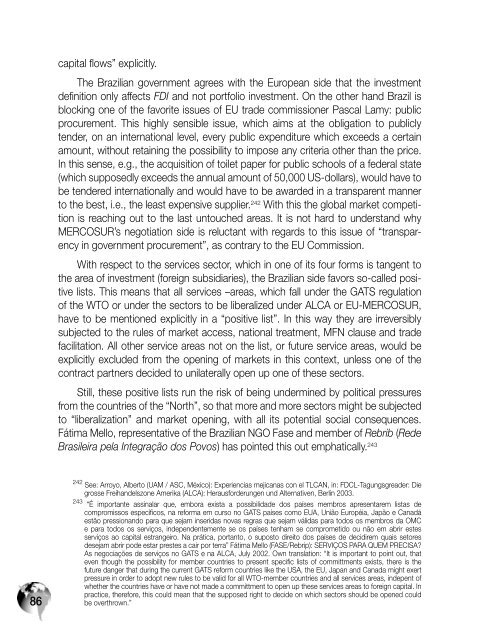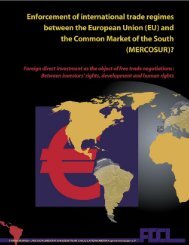(EU) and the Common Market of the South (MERCOSUR)? - FDCL
(EU) and the Common Market of the South (MERCOSUR)? - FDCL
(EU) and the Common Market of the South (MERCOSUR)? - FDCL
Create successful ePaper yourself
Turn your PDF publications into a flip-book with our unique Google optimized e-Paper software.
86<br />
capital flows” explicitly.<br />
The Brazilian government agrees with <strong>the</strong> European side that <strong>the</strong> investment<br />
definition only affects FDI <strong>and</strong> not portfolio investment. On <strong>the</strong> o<strong>the</strong>r h<strong>and</strong> Brazil is<br />
blocking one <strong>of</strong> <strong>the</strong> favorite issues <strong>of</strong> <strong>EU</strong> trade commissioner Pascal Lamy: public<br />
procurement. This highly sensible issue, which aims at <strong>the</strong> obligation to publicly<br />
tender, on an international level, every public expenditure which exceeds a certain<br />
amount, without retaining <strong>the</strong> possibility to impose any criteria o<strong>the</strong>r than <strong>the</strong> price.<br />
In this sense, e.g., <strong>the</strong> acquisition <strong>of</strong> toilet paper for public schools <strong>of</strong> a federal state<br />
(which supposedly exceeds <strong>the</strong> annual amount <strong>of</strong> 50,000 US-dollars), would have to<br />
be tendered internationally <strong>and</strong> would have to be awarded in a transparent manner<br />
to <strong>the</strong> best, i.e., <strong>the</strong> least expensive supplier. 242 With this <strong>the</strong> global market competition<br />
is reaching out to <strong>the</strong> last untouched areas. It is not hard to underst<strong>and</strong> why<br />
<strong>MERCOSUR</strong>’s negotiation side is reluctant with regards to this issue <strong>of</strong> “transparency<br />
in government procurement”, as contrary to <strong>the</strong> <strong>EU</strong> Commission.<br />
With respect to <strong>the</strong> services sector, which in one <strong>of</strong> its four forms is tangent to<br />
<strong>the</strong> area <strong>of</strong> investment (foreign subsidiaries), <strong>the</strong> Brazilian side favors so-called positive<br />
lists. This means that all services –areas, which fall under <strong>the</strong> GATS regulation<br />
<strong>of</strong> <strong>the</strong> WTO or under <strong>the</strong> sectors to be liberalized under ALCA or <strong>EU</strong>-<strong>MERCOSUR</strong>,<br />
have to be mentioned explicitly in a “positive list”. In this way <strong>the</strong>y are irreversibly<br />
subjected to <strong>the</strong> rules <strong>of</strong> market access, national treatment, MFN clause <strong>and</strong> trade<br />
facilitation. All o<strong>the</strong>r service areas not on <strong>the</strong> list, or future service areas, would be<br />
explicitly excluded from <strong>the</strong> opening <strong>of</strong> markets in this context, unless one <strong>of</strong> <strong>the</strong><br />
contract partners decided to unilaterally open up one <strong>of</strong> <strong>the</strong>se sectors.<br />
Still, <strong>the</strong>se positive lists run <strong>the</strong> risk <strong>of</strong> being undermined by political pressures<br />
from <strong>the</strong> countries <strong>of</strong> <strong>the</strong> “North”, so that more <strong>and</strong> more sectors might be subjected<br />
to “liberalization” <strong>and</strong> market opening, with all its potential social consequences.<br />
Fátima Mello, representative <strong>of</strong> <strong>the</strong> Brazilian NGO Fase <strong>and</strong> member <strong>of</strong> Rebrib (Rede<br />
Brasileira pela Integração dos Povos) has pointed this out emphatically. 243<br />
242 See: Arroyo, Alberto (UAM / ASC, México): Experiencias mejicanas con el TLCAN, in: <strong>FDCL</strong>-Tagungsgreader: Die<br />
grosse Freih<strong>and</strong>elszone Amerika (ALCA): Herausforderungen und Alternativen, Berlin 2003.<br />
243 “É importante assinalar que, embora exista a possibilidade dos países membros apresentarem listas de<br />
compromissos específicos, na reforma em curso no GATS países como <strong>EU</strong>A, União Européia, Japão e Canadá<br />
estão pression<strong>and</strong>o para que sejam inseridas novas regras que sejam válidas para todos os membros da OMC<br />
e para todos os serviços, independentemente se os países tenham se comprometido ou não em abrir estes<br />
serviços ao capital estrangeiro. Na prática, portanto, o suposto direito dos países de decidirem quais setores<br />
desejam abrir pode estar prestes a cair por terra” Fátima Mello (FASE/Rebrip): SERVIÇOS PARA QUEM PRECISA?<br />
As negociações de serviços no GATS e na ALCA, July 2002. Own translation: “It is important to point out, that<br />
even though <strong>the</strong> possibility for member countries to present specific lists <strong>of</strong> committments exists, <strong>the</strong>re is <strong>the</strong><br />
future danger that during <strong>the</strong> current GATS reform countries like <strong>the</strong> USA, <strong>the</strong> <strong>EU</strong>, Japan <strong>and</strong> Canada might exert<br />
pressure in order to adopt new rules to be valid for all WTO-member countries <strong>and</strong> all services areas, indepent <strong>of</strong><br />
whe<strong>the</strong>r <strong>the</strong> countries have or have not made a committment to open up <strong>the</strong>se services areas to foreign capital. In<br />
practice, <strong>the</strong>refore, this could mean that <strong>the</strong> supposed right to decide on which sectors should be opened could<br />
be overthrown.”









